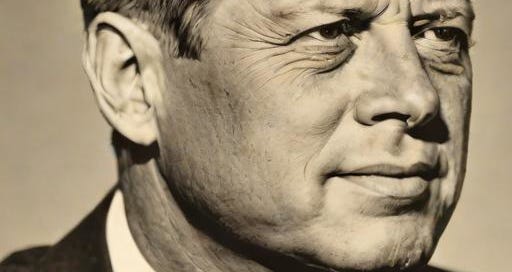JFK's Peace Speech: '...And We Are All Mortal'
Sixty two years year ago, President Kennedy gave one of his greatest speeches.
"...So, let us not be blind to our differences — but let us also direct attention to our common interests and to the means by which those differences can be resolved. And if we cannot end now our differences, at least we can help make the world safe for diversity. For, in the final analysis, our most basic common link is that we all inhabit this small planet. We all breathe the same air. We all cherish our children's future. And we are all mortal."
President Kennedy chose the commencement address at American University, June 10, 1963. to give a "peace speech" devoted to the need for co-existence with the Soviet Union, and used the speech to announce talks that would rapidly culminate in a Partial Nuclear Test Ban Treaty, ratified by the Senate in September.
Read and listen to the entire speech at the JFK Library and Museum website.



We all have our own perspectives regarding the assassination and why it consumes us. We were various different ages at the time it occurred. Some were young adults, some were teens, some were students from kindergarten to high school. Some in the community were not even born and yet they are just as consumed with trying to understand what really happened and how we find ourselves more than six decades later just now beginning to have a sense of how corrupt and monstrous forces pulled off a coup d’etat in plain sight and then successfully covered it up.
I was just turned twelve and just starting junior high school which was a big step from the simplicity of elementary school. The assassination for me was a great divide between the innocence of childhood and the complexities of adulthood. It sort of mimics what the nation experienced. I have many reasons for my own dedicated interest in the subject. Because of JFK’s resolution of the Cuban Missile Crisis of 1962 I believe I was able to have a life. With less wisdom I’m not so sure the world would have survived. I think of the benefits of JFK’s wisdom frequently because of the nuclear threats we live with today.
Jeff, this speech now gets the recognition and praise that it deserves. And we cannot talk about it "too much." It was largely panned or ignored by the mainstream media at the time; it received faint praise at best. JFK's second best speech was delivered the very next day, on June 11, 1963: his Civil Rights Speech. Two seminal books that address the Peace Speech are "To Move the World," by Jeffrey Sachs; and "Two Days in June," by Andrew Cohen. It was a major disappointment to me that on the 50th anniversary of the JFK assassination in Dallas, the keynote speaker, popular historian David McCullough, did not mention the speech AT ALL, even though several others were quoted in part. I found it most peculiar. Either David McCullough did not particularly admire JFK, or perhaps it was considered unacceptable to the establishment in Dallas to acknowledge that a man who was bucking the establishment (and traditional ways of thinking), in an attempt to change the course of American foreign policy at the height of the Cold War, was killed in their city (in other words, unseemly to even obliquely hint that his death might have been over policy, and not the random act of one deranged individual). For whatever reason, David McCullough ignored the Peace Speech on the 50th anniversary of JFK's assassination.